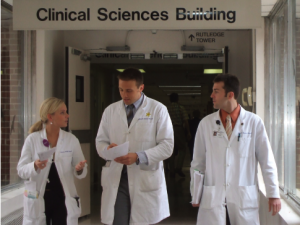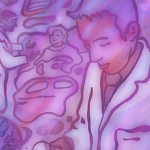MARGARET BLAIR BOBO was literally in a class by herself when she enrolled in the inaugural pharmacy residency program at the Medical University of South Carolina (MUSC) Medical Center in Charleston in 1958.Fresh out of the MUSC pharmacy school, where she was the only female in her graduating class, Bobo found being the program’s solo resident an exhilarating learning experience.
“My year there probably was the most monumental in my life,” Bobo said. “I had no pharmacy work experience, so I learned everything. I was a sponge.”
Bobo, who went on to join the MUSC staff as a pharmacist and assistant professor, is joining other alumni this year to celebrate the 50th anniversary of one of the country’s oldest residency programs. More than 450 pharmacists, have completed the ASHP-accredited program, a collaboration between the Medical Center and the South Carolina College of Pharmacy at the MUSC campus.
Over the years, the MUSC residency program has evolved into a multi-faceted program that is nationally known for the advanced practice experiences it offers. More than 40 clinical preceptors oversee the work of an average of 20 post-graduate year 1 (PGY1) and PGY2 pharmacy residents. About 200 pharmacy students apply for the available slots, of which only 60 are chosen for interviews.
Changing with the Times
William H. Golod, M.S., Ph.D., the program’s pharmacy and residency program director from 1959 to 1965, is credited by many with helping to triple the number of MUSC residents by the 1980s.
That growth in residents has translated into more pharmacy care for more patients and improved patient outcomes, said Wayne Weart, Pharm.D., FASHP, professor of clinical pharmacy and outcome sciences at the South Carolina College of Pharmacy and professor of family medicine at MUSC College of Medicine. He completed a residency at MUSC in 1972.
The growth means that MUSC is “training more residents who go out and apply the high level of care they learn in our program,” said Weart. “We have over 400 alumni who are doing great things all over the country.”
“When I was there, I’m not sure I appreciated how far we had come” from the program’s initial founding in 1958, he noted.
By the time Ray became director, the program had already developed a “strong clinical flavor,” he said. At that time, residents joined daily hospital rounds with medical teams.
Today, the MUSC program boasts an array of disciplines, from psychiatric pharmacy to ambulatory care to adult internal medicine. That variety helps residents find their niches and sharpen the skills that today’s pharmacists need to work on healthcare teams, said Paul W. Bush, Pharm.D., M.B.A., FASHP, director of pharmacy and graduate pharmacy education at MUSC.
“With 23 residency positions, I think our program contributes in a large way to the enhanced role pharmacists enjoy in healthcare today,” Bush said. Today’s residents mentor pharmacy students, educate fellow clinicians and patients about medication therapy, and participate in drug-use review and drug policy development and management.
“It’s important to note that MUSC’s residency program has been ASHP-accredited since 1963. The fact that it has met such rigorous standards for so long speaks to the quality of the programs required of the residents,” said Janet Teeters, M.S., director of ASHP’s accreditation services division.
ASHP has been accrediting pharmacy residency programs to ensure consistent training and improve the level of practice since 1963. The Society will reach its own milestone—1,000 accredited programs—this year.
Current MUSC resident Michael DeCoske, Pharm.D., is thankful he has been able to experience so many facets of pharmacy before choosing his career path.
“It’s a great environment to start off a career in pharmacy,” he said. “You receive a lot of great career guidance. If I had never come here, I might have been off doing a specialty that wasn’t the best fit for me.”









 If you want to contribute tutorials, news or other stuff please contact us. We pay 150 for each approved article.
If you want to contribute tutorials, news or other stuff please contact us. We pay 150 for each approved article. Consectetur adipisicing elit. Sed do eiusmod tempor incididunt ut labore.
Consectetur adipisicing elit. Sed do eiusmod tempor incididunt ut labore. This site uses valid HTML and CSS. All content Copyright © 2010 Newscast, Inc
This site uses valid HTML and CSS. All content Copyright © 2010 Newscast, Inc If you like what we do, please don't hestitate and subscribe to our
If you like what we do, please don't hestitate and subscribe to our